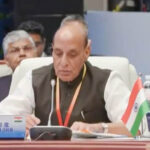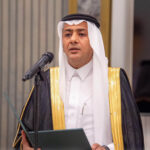Mehjabin Bhanu: Defense cooperation between the USA and Bangladesh has made significant progress in the last few years. It is depicted in the exchange of visits between the leaders of the two countries, as well as the conduct of training programs, joint exercises, and humanitarian assistance and disaster relief (HADR). US has always cherished its close ties with Bangladesh and at the same time works to strengthen its ties while contributing to Bangladesh’s development agenda. Bangladesh has become important partner under US’ flagship ‘Indo Pacific Strategy’ policy. Cooperation between the two countries is extensive in all areas including trade and commerce, power and energy, science and technology, defense and security, maritime affairs, climate change and sustainable development.
Bangladesh Army Chief General SM Shafiuddin Ahmed left for the United States on an official visit on Sunday at the invitation of the US Army to attend a military conference in Honolulu Hawaii.
Inter-Services Public Relation Directorate in a press release stated that the army chief, during his visit, would participate in the Land Forces Pacific, better known as LANPAC, Conference to be held between May 16 and May 18.
The ISPR stated that the aim of the conference is to create an atmosphere of mutual trust, develop professional relations and strengthen the regional security system through the development of relations among the land forces in the Indo-Pacific region.
Apart from participating in the conference, the army chief would hold bilateral meetings with other army chiefs and other high-ranking military officials from different countries and discuss various issues of mutual cooperation.
This is his third official visit to the US after becoming the chief. In September 2021, the army chief went to the US on a week-long visit to join the 12th biannual Indo-Pacific Armies Chiefs Conference taken at the Hilton Hawaiian Village on Oahu in Hawaii with chiefs of armies from around the Indo-Pacific region.
In April 2022, General Shafiuddin also visited the US at the invitation to meet US army high officials including army chief of staff and chief of national guard in Pentagon of Washington DC and officials at the defence secretary office.
General Shafiuddin participated in a roundtable on South Asian Regional Security, and met the leading personnel at the Department of Safety and Security, Department of Operational Support and Department of Political and Peace building Affairs at the United Nations Headquarters in the US.
LANPAC on their website states that the Association of the United States Army’s 2023 LANPAC Symposium and Exposition is a world-class, international event highlighting the role of land forces in the Indo-Pacific theater and their contributions to the joint force in peace and war. The strategic location of Hawaii brings together government and industry representatives from their allies in the Indo-Pacific theater, it added.
The Bangladesh army chief’s visit, most importantly, are taking place at a time when Bangladesh government has recently set an ‘Indo-Pacific Outlook’ officially, the 6th Indian Ocean Conference has ended Dhaka on May 13 stressing the need for greater among the member countries for tapping the immense potentials of the Indian ocean region. And Myanmar, Bangladesh are trying to solve the Rohingya crisis with the inspiration of Chinese mediation. US Deputy Secretary of State Wendy Sherman has said they are seeking to provide $6 million, working with the US Congress, for regional maritime security initiatives – partnering with Bangladesh, India, Maldives, and Sri Lanka. This funding will bolster interdiction and law enforcement capacity in the Indian Ocean’s South Asian sub-region, she said.
However, the visit is obviously part of the “outstanding” bilateral defence relations between Bangladesh and US. The BD Army chief’s visit can strengthen relations between the two armies on a bilateral level and serve as a catalyst for improved coordination and collaboration between the two nations on a variety of strategic problems. US-Bangladesh relations would reach a new level. Bangladesh could gain trust from the US government because US is an active member of the Indo-Pacific alliance. Bangladesh, on the other hand, can handle the Chinese predicament intelligently because its goal is to engage structurally rather than militarily. Discussions would also be held about various ways to improve the conduct of military exercises on a more rapid and decisive scale. Defence and security are significant elements of US and Bangladesh’s bilateral relations, and the armed forces of the two nations cooperate and coordinate with one another on numerous levels. US can assist Bangladesh in achieving the goal of implementing Bangladesh’s visionary military plan, “Forces Goal 2030. This could assist in bolstering bilateral ties and reflecting better bilateral understanding. This visit is highly important for Bangladesh and US for the region. The visit is obviously as part of the “outstanding” bilateral defense relations between Bangladesh and USA. The two may discuss ways to enhance and strengthen bilateral defense cooperation.
BD Army chief this visit can strengthen relations between the two armies on a bilateral level and served as a catalyst for improved coordination and collaboration between the two nations on a variety of strategic problems. US-Bangladesh relations would reach a new level. Bangladesh could gain trust from the US government because US is an active member of the Indo-Pacific alliance. Bangladesh, on the other hand, can handle the Chinese predicament intelligently because its goal is to engage structurally rather than militarily. Bangladesh essentially sets an example for the other littoral nations by outlining its Indo-Pacific orientation. Bangladesh government has recently set an outlook for peace in the Indo-Pacific through dialogue and understanding. The foreign ministry of Bangladesh published the guidelines and objectives for the region at a press conference recently ahead of Prime Minister Hasina’s key visit to Japan, the US and the UK. The army chief has recently completed his India visit to strengthen strategic ties. His US visit is also seen very important strategically for the region because India and US are strategic allied in the region.
Bangladesh has to clarify its position on the Indo-Pacific so that no one can misunderstand or mislead. As a result, Bangladesh has moved to a better position. Because there will be important bilateral discussions with the BD Army chief’s during his visit to USA. Before this, USA clearly knew Bangladesh’s position on the Indo-Pacific. The country’s relationship with Bangladesh will move forward based on this position.
Bangladesh is now inching closer to embracing the Indo-Pacific Strategy. However, Bangladesh has never strayed from its founding principle of nonalignment and wisdom drawn from its independence hero Bangabandhu Sheikh Mujibur Rahman which can be summed up as Friendship to all and malice toward none.
Bangladesh essentially aims to balance relations with rival states. Many explain that Prime Minister Sheikh Hasina does not keep eggs in one basket. Thus, she wants to maintain diplomatic, economic and strategic partnerships albeit “unequally” with the United States, Russia, China, European Union, Arabs and of course India.
Bangladesh is a key ally of the United States in South Asia. On issues including as regional and global security, counter-terrorism, and climate change, the two countries enjoy substantial collaboration. Bangladesh has played an important role in the Obama administration’s major international development projects, including as food security, healthcare, and the environment. In 2012, the two countries inked a strategic conversation agreement. In 2015, Marcia Bernicat, the US Ambassador to Bangladesh, praised relations as “vibrant, multifaceted, and important.
The United States’ strategy with Bangladesh places a premium on political stability, human rights, and democracy. Bangladesh is also seen by the United States as a moderate Muslim friend among Islamic countries.
One of Bangladesh’s most important strategic military partners is the United States. Defense cooperation between the United States and Bangladesh is growing day by day. Regular joint exercises are performed, particularly in the Bay of Bengal. The United States Pacific Command engages the Bangladesh Armed Forces on a regular basis. The US also assisted in the formation of the Bangladesh Navy’s elite SWADS marine unit, which is fashioned after American and South Korean special forces.
Bangladesh is the greatest donor to UN peacekeeping operations in the world. Bangladeshi peacekeeping missions have benefited greatly from the sponsorship of the United States.
Strong and expanding economic ties between the two nations are the bedrock of the US-Bangladesh relationship. Bangladesh has suddenly developed into one of the world’s fastest growing economies during the previous five decades. Bangladesh is on track to become the world’s 24th largest economy in 10 years, with an expected growth rate of 7.2 percent in 2022. Bangladesh’s growth and resiliency are built on development and foreign direct investment, and the United States remains a dedicated partner.
Bangladesh is located in the heart of the Indo-Pacific, a region that the Biden-Harris administration has prioritized for economic connectivity, bilateral relations are also focused on shared democratic values, free enterprise, resilient supply chains, and the prosperity and health of both countries’ people.
We see major areas of engagement that may be strengthened to deepen defense and security cooperation as both celebrate 51 years of US-Bangladesh relations on April 04, 2023.
This was notably true during the pandemic, when Bangladesh delivered over 6 million pieces of personal protective equipment to the United States during the first catastrophic wave of Covid-19.
However, 2021 was a challenging year for relations between the United States and Bangladesh. Washington had imposed sanctions on Bangladesh’s Rapid Action Battalion (RAB) and several current and former officers for a long history of human rights violations, including extrajudicial killings on December 10, 2021. Then there were ups and down between Bangladesh-US relations.
Amidst these, the signing of a draft defense cooperation agreement during Nuland’s visit to Dhaka exemplifies that effort. However, Washington may continue to regard Dhaka as a security partner in the region. US now wants to build a strategic relation with Bangladesh.
President of the United States, Joe Biden, has voiced his belief earliar that the Dhaka-Washington relationship will thrive for the next 50 years and beyond.
In a letter to Bangladeshi Prime Minister Sheikh Hasina, he noted that ‘Our defense cooperation is stronger than ever,’ the US president said, adding that the Bangladesh Coast Guard and Navy are essential allies in ensuring a free and open Indo-Pacific area, as well as contributing to the regional fight to combat human and illicit drug trafficking.
According to the US government websites, Bangladesh has received $66.9 million in Foreign Military Financing (FMF) and $7.29 million in International Military Education and Training (IMET) aid from the United States since 2015. FMF funding includes $10 million in bilateral programs and $56.9 million in regional FMF for the Bay of Bengal Initiative. Through FMF support, the Department of State’s Bay of Bengal Initiative aims to improve civilian and military actors’ capacity to detect illicit activity within their borders and in the region, build networks and habits of cooperation to allow countries to share information, develop their capacity to respond quickly to illicit activity, and support our partners in enabling a rules-based order in the Indian Ocean Region.
In support of the Indo-Pacific Strategy, US security aid to Bangladesh has improved maritime security, freedom of navigation, and humanitarian assistance/disaster response capabilities. These funds have been used to purchase patrol boats for the Bangladesh Army, additional patrol vessels for the Navy, international peacekeeping and border security missions; electronic and mechanical upgrades to the Bangladesh Navy’s fast patrol boats and former US Coast Guard cutters; technical and professional training for Bangladesh military and Coast Guard personnel; and joint military exercises. This assistance has helped Bangladesh significantly in its efforts to improve its marine domain knowledge and control.
This visit could help strengthen bilateral defense ties. Bilateral defense ties may boost up bilateral relations. USA needs Bangladesh in the region and vice versa. This visit conveyed the message that despite having some bilateral problems, both countries are very interested to strengthen further bilateral ties. This may help solve bilateral problems. Bangladesh and USA must engage as trusted partners to deal with some common problems.
UN officials showed an interest in sending more Bangladeshi peacekeepers to the UN. The Bangladesh army leader requested that the Bangladeshi contingents of the UN peacekeeping force replace their old weapons and equipment with new weaponry and equipment sourced from Bangladesh.
During the meetings, the army chief may emphasize Bangladesh’s constitutional commitment to world peace and raised issues of Bangladesh’s interest in UN peacekeeping operations, such as the recruitment of more Bangladeshi peacekeepers, including women, the appointment of high-ranking military officials in various peacekeeping operations, participation in peacekeeping missions co-pledging with other countries, the deployment of armed personnel carriers from Bangladesh, and the recruitment of armed personnel carriers from Bangladesh.
The United States intends to help Bangladesh modernize and institutionalize its armed forces by supplying defense equipment and training.
The United States emphasized the signing of two defense accords – GSOMIA and ACSA – that serve as foundations for defense trade and cooperation.
However, the majority of the US military assistance to Bangladesh is in the form of training for defense professionals and joint exercises between two forces. The United States Pacific Command engages the Bangladesh Armed Forces on a regular basis. US Defense Secretary Mark Esper paid a visit to Bangladesh Prime Minister Sheikh Hasina and discussed military cooperation between the two countries, among other things. Bangladesh army chief paid his US visit this month after the successful completion of ‘Security Partnership Dialogue’ in April. 2022 in Dhaka. This visit is very significant for Bangladesh and USA in the region. The USA and Bangladesh has strengthened their defense ties further through this visit.
Mehjabin Bhanu is a Bangladeshi writer, columnist, commentator on international affairs specially South Asian affairs.







